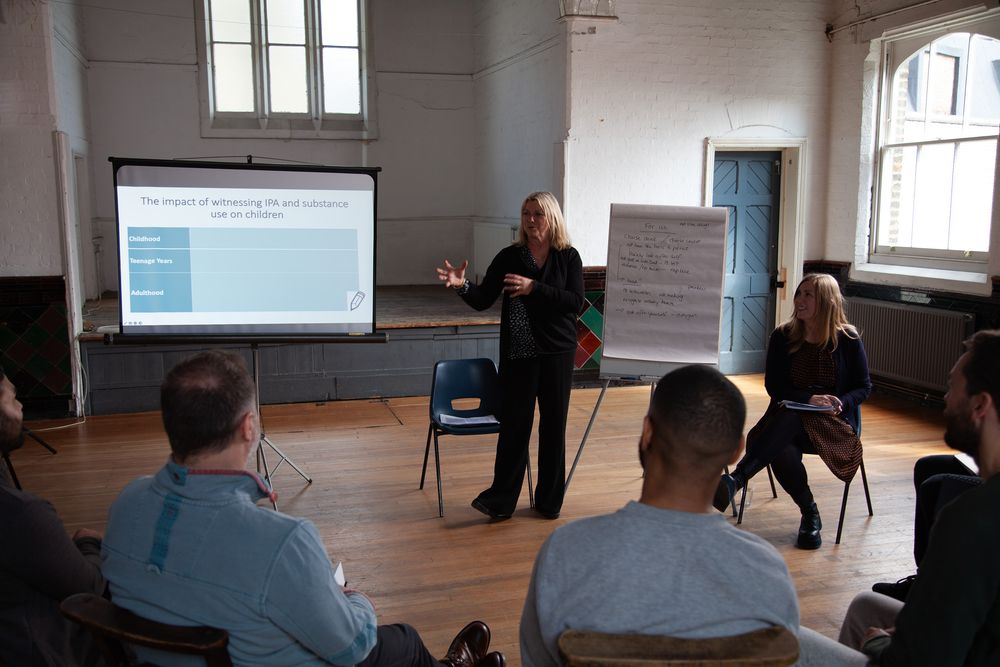
Evaluation
ADVANCE-D was originally developed and tested for men in substance use treatment.


Now Available
We offer comprehensive training to address IPV in the context of substance use through local programme delivery.
Research-Backed Impact of the ADVANCE-D Programme
ADVANCE-D was originally developed for and tested with men in substance use treatment. It was found to be feasible for trained substance use treatment staff to deliver ADVANCE-D and acceptable to men who participated the programme.
Men who were offered the ADVANCE-D group programme, compared to usual substance use treatment only, reported promising clinical outcomes and positive behaviour change, including reductions in IPV perpetration.
Has it been tested?
ADVANCE-D was originally developed for and tested with men in substance use treatment and has since been offered to 94 men (54 in the treatment arm of a randomised controlled trial) and 40 in a feasibility study). It was found to be feasible for trained substance use treatment staff to deliver ADVANCE-D and acceptable to men who participated the programme. Men who were offered the ADVANCE-D group programme, compared to usual substance use treatment only, reported promising clinical outcomes and positive behaviour change, including approximately 70% reductions in the use of abusive behaviour towards a current or ex female partner.
Does it work?
Staff were trained in 7 substance use treatment services in the UK to deliver ADVANCE-D to 40 men. At the end of the programme 17/25 men followed-up had reduced their abusive behaviour.
-
“It’s given me the tools I need to do things a bit different, and stop things getting worse”
- ADVANCE-D Group Member -
“I realised that you can be abusive in tons of different ways and some of my behaviour was abusive… it’s definitely improved the relationship and the communication”
- ADVANCE-D Group Member
Accreditation Standards
It can be hard to know if something ‘works’ relying on empirical evaluation alone, so internationally, justice and social care services have set accreditation standards for programmes, being delivered in justice and social care settings, similar to NICE guidelines in healthcare, specifying what good programmes should include.
The ADVANCE-D training has been developed to be available as a standalone, online training package.
It can be hard to know if something ‘works’ relying on empirical evaluation alone, so internationally, justice and social care services have set accreditation standards for the delivery of programmes, specifying what good programmes should include.
In the UK, The Correctional Services Accreditation Panel (CSAP) and The Scottish Advisory Panel on Offender Rehabilitation (SAPOR) accredit programmes for justice and the HMPPS National Effective Interventions Panel (NEIP), approve structured interventions for probation services.
-
“I do think his behaviour has changed, and I think it’s because he realises that not everybody in this world is perfect… we’re equal partners”
- Partner of ADVANCE-D Group Member -
“He’d normally hold everything and then throw it in my face in an argument, but now we’re having conversations about it”
- Partner of ADVANCE-D Group Member -
“It’s given me the tools I need to do things a bit different, and stop things getting worse”
- Perpetrator -
“I realised that you can be abusive in tons of different ways and some of my behaviour was abusive… it’s definitely improved the relationship and the communication”
- Perpetrator -
“By the end of it, they (men) were completely able to identify with behaviours, able to remove self from action and able to understand the whole idea of this was to help them. They were also able to reflect on the positive influence it had on their relationships...They saw the benefit it was bringing. Once they got going and they saw the benefit, then they wanted more of it because it really did help the relationship”
- ADVANCE-D Facilitator -
“I think this training is so powerful and helpful for my role and am very grateful for the opportunity”
- ADVANCE-D Facilitator
